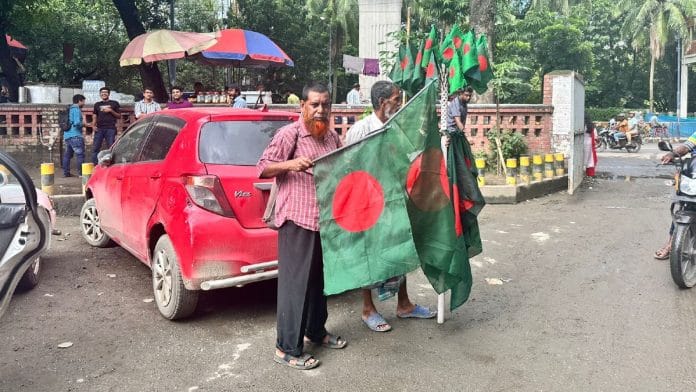Dhaka is a city waiting for something to happen. It is in search of new national heroes that fit its freshly minted post-“revolution” iconoclasm and is reassessing old ties, particularly with a country it has been close to since before its birth: India. But Dhaka has not yet allowed this newness and future uncertainties to overwhelm it or change its basic character as a city and a people.
“Go back and write what you felt,” a politician told me as I wrapped up my six-day work trip to Bangladesh. I was an Indian in Dhaka, a city brimming with outrage and disappointment against India.
From unrest in the readymade garments sector to the Adani Group’s reduction in power supply worsening an already critical energy situation, the Indian hand is seen everywhere in Bangladesh. Not all of it is real.
Towering above all conversations is the spectre of former Prime Minister Sheikh Hasina in Lutyens’ Delhi. Now completing three months of her stay in the Indian capital, she continues to supply Bangladesh’s political mills with fresh fodder through strategically leaked audio clips. India is detested with all the fervour a new and bitter divorce sparks.
But for a Bangla-speaking Indian like me, Dhaka cannot help but be a warm city. People extend impromptu dinner invitations at the drop of a hat and the faces of staff at the hotel reception light up when you ask them about restaurant options for local cuisine, shunning the list of Indian restaurants they have handy. The occasional reference to the “woman in your country” will come up in professional conversations, devoid of any real rancour.
‘A Bengali like us’
Every once in a while, the mention of the possibility that all Indians currently in Dhaka may have affiliations to India’s Research and Analysis Wing (R&AW) takes the candour out of discussions. Potential interviewees sometimes clam up when your questions are “too probing”. But at no point during my stay did I feel worried about my safety, contrary to what friends, family, and professional contacts had told me as I was planning the trip.
The people of Dhaka have an uneasy relationship with their police force, thanks to the organisation’s role in the state-sponsored violence against the quota reform protesters in July and August. There are stories of snatchings and petty crimes, but not the kind that are riling up millions in India.
Instead, television channels play visuals of the resplendent Katayani Puja in Magura, reminiscent of West Bengal’s Jagaddhatri Puja. Occasionally, a taxi driver starts a conversation and stumbles upon the fact that one does not belong to the country. “But you are a Bengali,” comes the confused response, before my origins are traced to Kolkata, a city many are familiar with or want to visit. Often, I let that sit, choosing not to mention that I relocated to New Delhi a couple of decades ago. India’s seat of power is not very popular at the moment in Bangladesh.
For all its present antipathy to India, however, Dhaka played the perfect host. Phones were furiously worked to get me the meetings I needed and follow-up calls made to find out how they went. Sometimes, late meetings—politicians have a penchant for late nights—prompted the question, “Did he ask you to stay for dinner?” There was ready judgement if they did not.
The angst about India stopping visa services surfaced periodically as people recounted the lines they had to work to obtain even a travel clearance for critical medical procedures like bypass surgery. There are also other, less urgent trips that have been shelved for now.
“My wife, given a choice between shopping in India and London, would choose Delhi or Kolkata any day,” said a corporate executive.
There were voices of scepticism too. Uncertainties surrounding the Rooppur Nuclear Power Plant—which India was helping with and which could have eased Bangladesh’s current energy crisis significantly—fuel distrust and anger among those most affected. The dominant narrative about the power plant is that work has stopped because “the Indians have fled.”
But for every voice attempting to link me with the R&AW, there were more than a few that pushed doors open with the line, “She’s a Bengali like us.”
Also read: The real problem to Goa tourism isn’t from social media. Sea view homes are killing mangroves
Uncertainties in Dhaka
Dhaka’s similarities with Kolkata are stark but there are jarring differences too. Traversing a few bylanes around Nayapaltan where the headquarters of the Bangladesh Nationalist Party (BNP) is located, it is not easy to digest the sight of decrepit pharmacies advertising their expertise in Khatna (female genital mutilation). As the country fawns over its women’s football team that recently won the SAFF championship, the adoration does not go down well with a Muslim religious leader. But the rise of fundamentalism in Bangladesh predates the fall of Hasina, a fact conceded even by some of her staunchest supporters.
These are not easy times for Bangladesh.
There is political uncertainty. Living expenses are through the roof and industries are grappling with foreign orders leaving the country and insecurities about a dispensation that is yet to earn its stripes in governance. As the spokespersons of the “NGO government“ did rounds of television interviews to mark their three months in the saddle, questions about inflation and law and order were a common thread.
But rickshaw pullers, traders, and big businessmen in Dhaka continue to display the famed Bangladeshi resilience as they negotiate political and professional challenges with a smile, a big heart, and the catchphrase, “Somosya nai (No problem).”
Abantika Ghosh is a journalist and public policy professional who was recently in Dhaka for a project. She tweets @abantika77. Views are personal.
(Edited by Prasanna Bachchhav)







Why have you used “Khatna (female genital mutilation). ” Khatna is circumcision and very common in Muslim countries, it does not mean female genital mutilation.